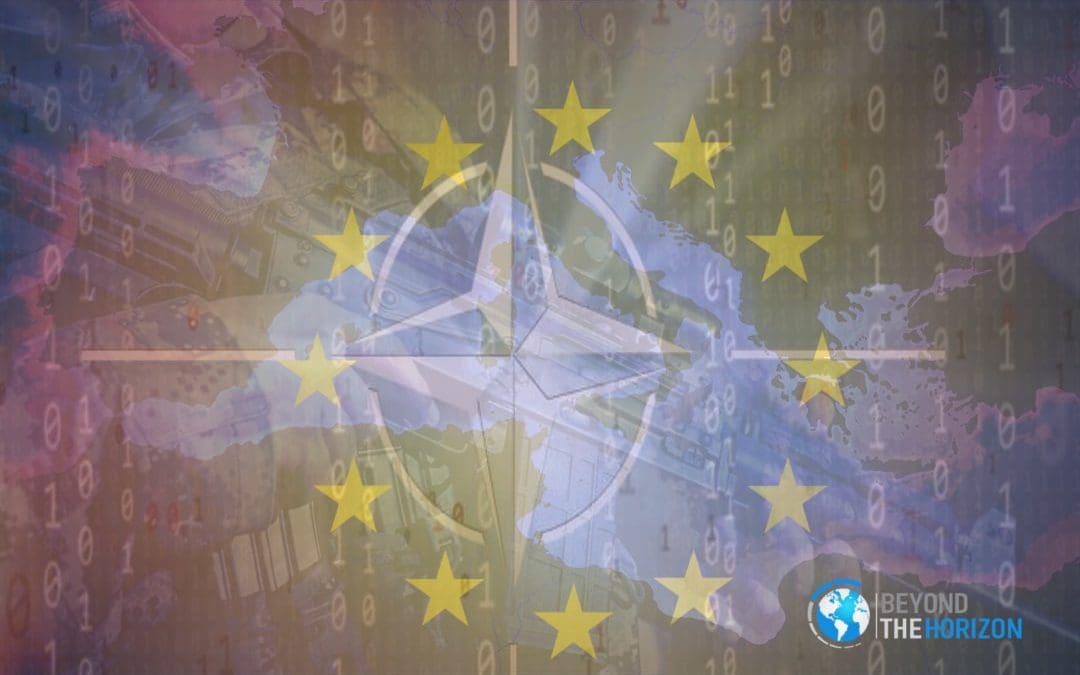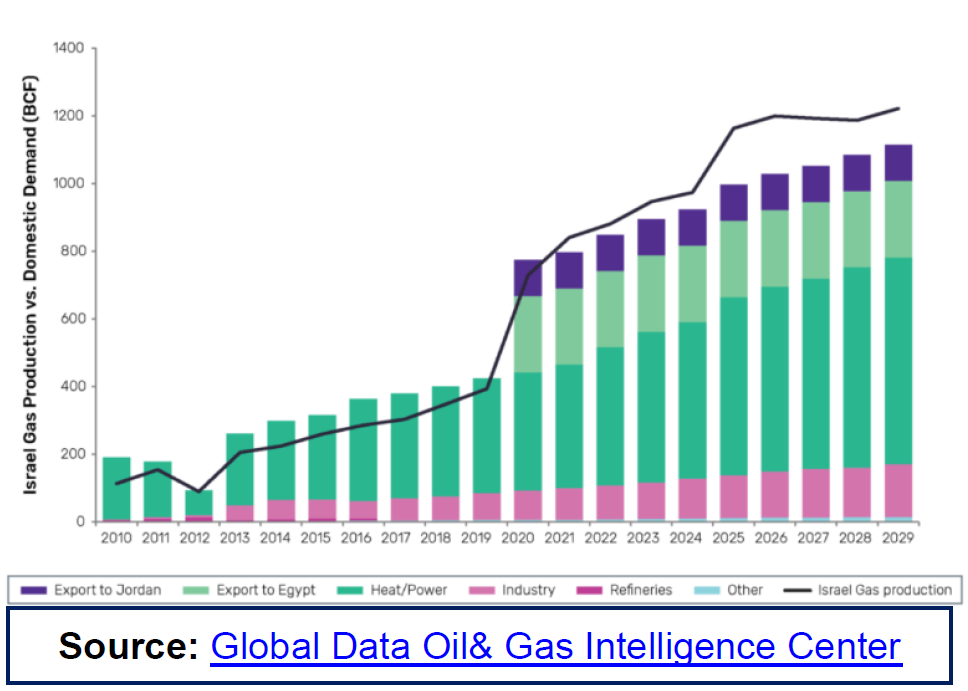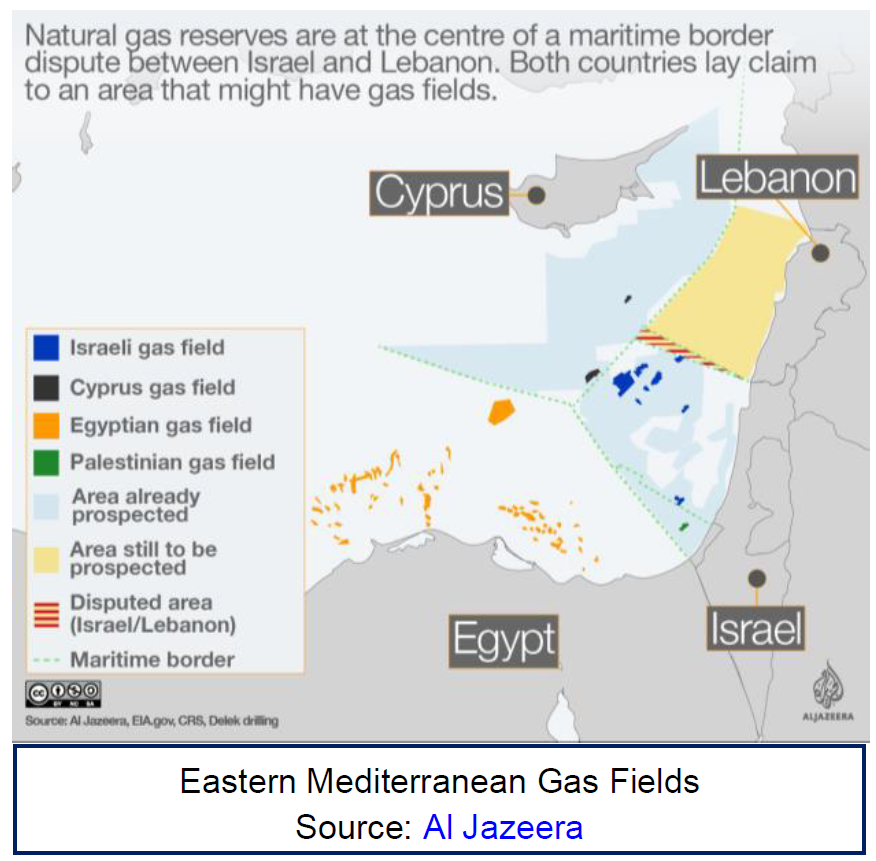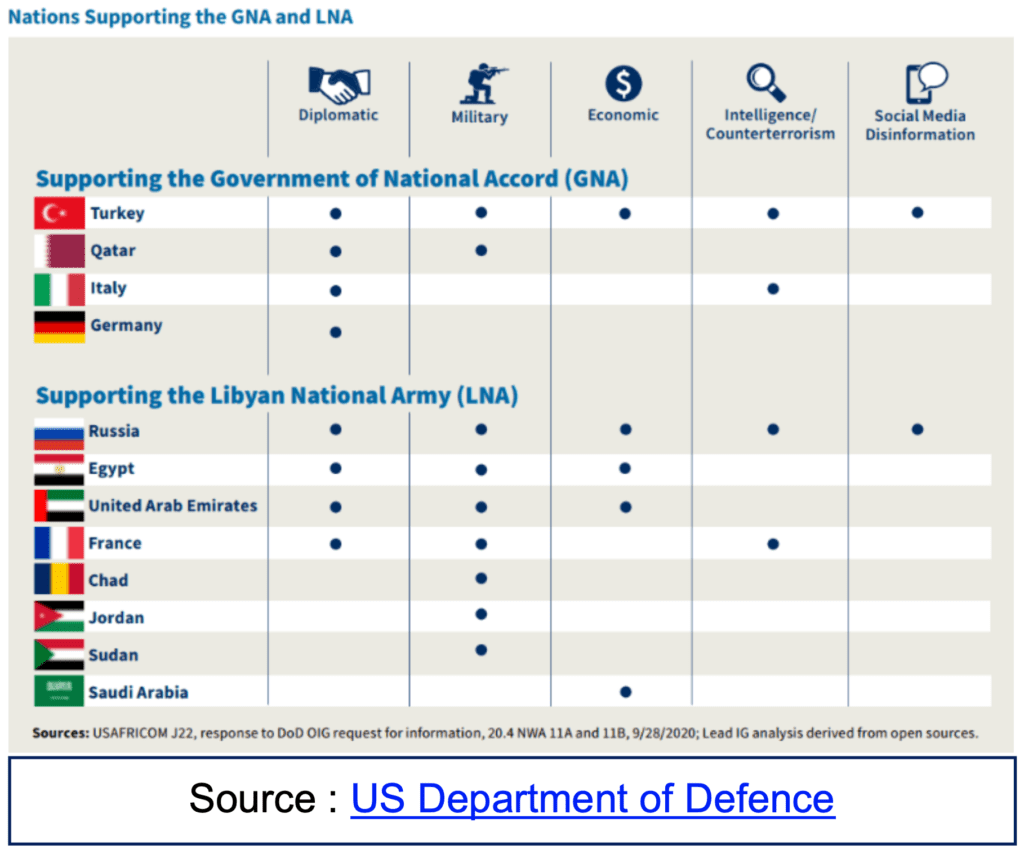|
by Emre Bilgin, Erman Atak, Furkan Akar, Hasan Suzen, Ibrahim Jouhari, Onur Sultan, Ramazan Turkmen, Saban YUKSEL DECEMBER 09, 2020 | 12 min read |
Background
- Discoveries of new energy resources in the Mediterranean started a scramble for exploitation and rekindled the old disputes over maritime zones.
- The temperature in the Eastern Mediterranean spikes exponentially as countries push their warships into the region. As such recent clashes between Turkish and Greek frigates, an increasing number of naval exercises, and naval/military upgrade by nations cause a surge in the militarization of the issues and devise a ticking bomb into the regional politics.
- Combined with the other conflicts in the region, notably Libya and Syria, there are spill-over effects which send an invitation to non-regional actors i.e. the Gulf States to actively involved in and take sides with Mediterranean nations. Thus, a new balance of power has emerged in the region.
- US retrenchment has fostered the cleavages, neither NATO nor the EU can act as a mediator between the parties since their members are divided over how they should handle the issues. However, the incoming US administration can transform the picture by pursuing a more active foreign policy.
Analysis
The European Union
Disputes between Greece and Turkey are not new, neither in Aegean nor in the Mediterranean Sea. Nevertheless, apart from the «EU’s deep concerns», these confrontations were sufficiently local, not bothering much the international and even regional community. Nothing has changed in the case of the Aegean Sea while stakes are getting higher in the Eastern Med, mainly for two reasons: the discovery of the natural gas in the Zohr field off the shore of Egypt, and Turkey’s ever-increasing unilateral/ambitious policy. Both pushed Turkey into more isolation and aggression.
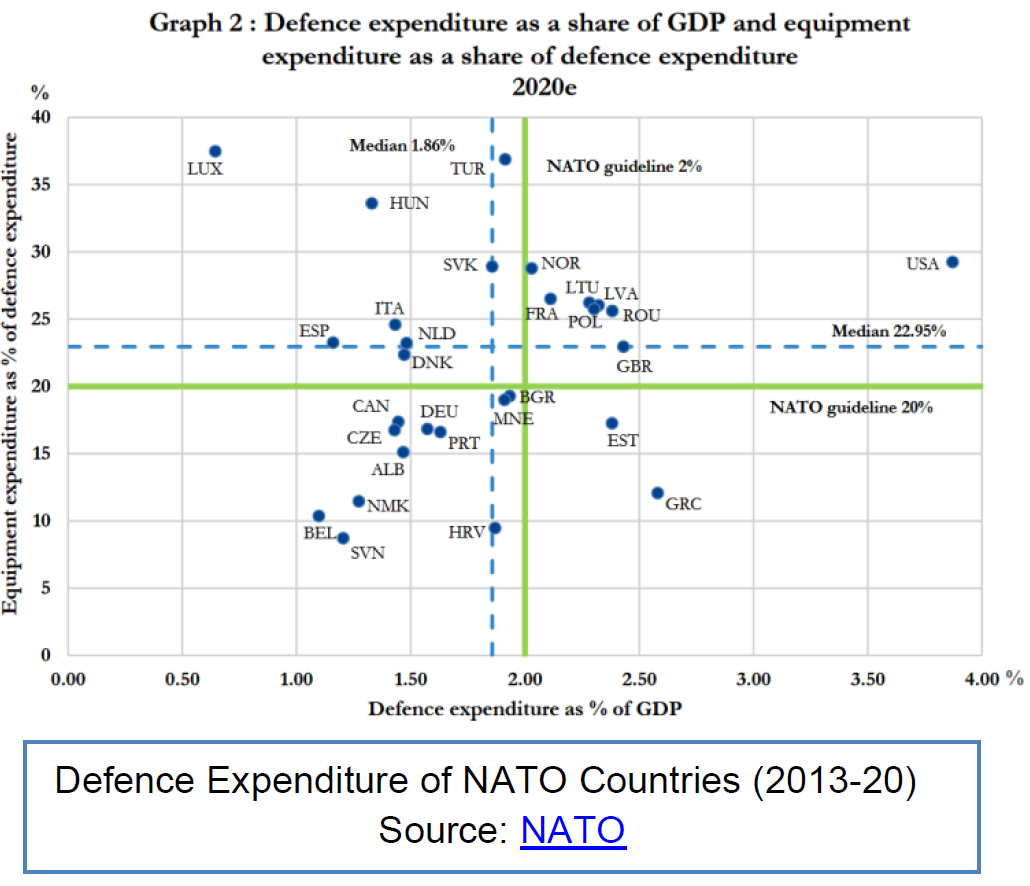 Greece strives to upgrade its army to achieve military superiority due to the escalating tensions in the region. While Greece is the 2nd highest spender (2.58) in terms of military spending as a share of GDP, equipment spending as a per cent of defence expenditure is very low (12.1). Having said that, Greece did not invest in military equipment and weapons enough. Greece also pushes its European peers to impose an arms embargo along with sanctions upon Turkey, notably for the delivery of Type-214 submarines, which may upset the naval balance of power in the Mediterranean.
Greece strives to upgrade its army to achieve military superiority due to the escalating tensions in the region. While Greece is the 2nd highest spender (2.58) in terms of military spending as a share of GDP, equipment spending as a per cent of defence expenditure is very low (12.1). Having said that, Greece did not invest in military equipment and weapons enough. Greece also pushes its European peers to impose an arms embargo along with sanctions upon Turkey, notably for the delivery of Type-214 submarines, which may upset the naval balance of power in the Mediterranean.
The EU is still divided over the response against Turkey. Germany presiding the EU Council follows a more neutral position to find common ground, unlike France. A group of member states comprising of Italy, Malta, Spain and Portugal pioneered by Germany is unwilling to push for harsher sanctions. Moreover, Hungary also makes statements about Turkey’s importance to the EU since PM Orban and President Erdogan have close relationships. Greece has lost its faith for the EU to some extent, and condemn its peers, particularly Germany, and wants to make new friends from other regional players as hedging.
There is an emerging alliance in the Mediterranean that its base is very pragmatic and practical: anti-Turkey rhetoric. Greece is satisfied with this situation, which makes its hand stronger against Turkey. This anti-Turkey alliance comprised of Cyprus, Egypt, France, Greece, Israel, and UAE fosters their politico-military relationship with different exercises, agreements, and initiatives, e.g. Eastern Mediterranean Gas Forum excluding Turkey, Medusa-2020 military drills, demarcations pact between Egypt, and Greece, Greece-UAE agreement including a defence clause.
France has a particular place in the emergence of this alliance as a Mediterranean nation with a robust naval power. It is not a Greek but a French success to leave Turkey even more isolated as France took a firm stance from the beginning. In September, France gathered 7 Southern European States against Turkey, including Italy, Spain and Malta, all of whom are lukewarm about a harsh stance. Besides, French warships regularly show the flag in the region as support to Greece and Cyprus. Lastly, France did not hesitate to firmly denounce Turkey in every platform, e.g. EU, NATO, ad hoc gatherings.
France is not likely to crown its efforts with a resolute stance form the EU. Although Italy, Spain and Malta are sided with France in the East Med, they are unlikely to go further because they have strong commercial relations with Turkey and coinciding interests seen in Italy-France dispute in Libya. In fact, there is a consensus in the Union on Turkey that its recent aggressive behaviours are not acceptable. However, when it comes to sanctions, there are quite a lot of member states that do not want to take strict action. The European Council will not probably approve harsher sanctions and wait until the next US administration even though policy-makers in Brussels and capitals know Turkey’s recent moves are merely tactical. The most likely result is light/symbolic sanctions targeting a couple of low-level officials.
Turkey
Turkey is increasingly playing an assertive role in the region, and it has got political and military footprints in conflicts, e.g. Eastern Mediterranean, Libya, and Syria. Nevertheless, the disputes in the East Med and Cyprus are deep-rooted and have many aspects like international law, territorial claims, and demarcation issues. Even in times when Turkey was pursuing a favourable and pro-European foreign policy, the issues could not be resolved. Hence, Turkey’s ambitions in the wider should not be mixed with the problems in the East Med, which prevents a health understanding of the situation. Apart from the rhetoric and discourses of both sides, there is nothing substantially new. That is why even the harshest opponents of Erdogan advocate for a powerful stance in this issue.
On the other hand, Turkey toughens its means to achieve its goals. Sending Oruc Reis survey vessel to the disputed waters along with frigates, Turkey has implemented gunboat diplomacy and does not avoid confronting other navies, that devise a ticking bomb among nations. There are also domestic dynamics, e.g. plunge of the Turkish currency, ultra-nationalist partner of the government, and mobilization of his constituency, which exceeds the scope of this analysis.
Turkey is watching two important summits coinciding at the 2nd week of December; European Council meeting and US Congress, both of which will discuss sanctions for different reasons. The damage of US Sanctions is also dependent on which President will implement them, considering that the President can select them from the defence bill of US Congress.
Facing exclusion, and possible sanctions, Turkey has applied for several political, military and economic measures. Politically, there is an abrupt rapprochement with Saudi Arabia, for which incoming US president has shown his discontent. Moreover, Turkey holds secret talks with Egypt and Israel. The call of a retired pro-Erdogan admiral for an Israel-Turkey delimitation agreement comes after these talks. Moreover, recognition of Turkish Cypriots by its allies may strengthen Turkey’s hand if the diplomatic moves succeed.
Economically, the Turkish parliament passed a bill that aims to shelter Turkish energy companies by moving them to off-shore jurisdictions against possible EU/US sanctions. Besides, excluded by regional players, Turkey’s efforts to construct a port as part of Belt and Road Initiative (BRI) may bring China to the East Med in favour of Turkey. That can be game-changer by making China a more robust and active player in the region. However, there is a long way to go for constructing the port and establishing it as part of BRI network.
Militarily, Turkey enhances domestic military-industrial base to be less dependent on arms imports by producing new weapons/systems. However, it still needs partners to support this option since Turkey is heavily dependent upon Western supplies. The recent cooperation with Ukraine may provide some critical parts, e.g. engines for UAVs and missiles as very partial compensation. In addition, Turkey decided to increase its maritime situational awareness by constructing traffic surveillance stations after its ship Operation IRINI inspected a Turkish flagged merchant vessel. Observing the maritime picture by radars and dispatching fast and small naval vessels can provide a more efficient way to operate in the Eastern Med by deploying fewer warships at sea.
Finally, President-Biden, who advocate for an active US Leadership may alter US Policy towards the region. Furthermore, even though it is a part of the 1960 Guarantee Agreement, the UK has not stepped in and keeps its silence regarding the Cyprus issue. Suppose two significant countries of NATO start to speak and act upon the Mediterranean. In that case, they can transform the whole balance of power unexpectedly, that cannot be changed by the divided EU, Greece, France, anti-Turkey alliance, Turkey’s gunboat diplomacy or plunging Turkish Lira. Thus, next year is full of surprises.
Turkish Cypriots
The rejection of Annan Plan by Greek Cypriots despite the approval of the Turkish side, and following the accession of the EU regardless of the referendum’s result generated distrust among Turkish Cypriots. Moreover, even though everyone agrees on the Turkish part of the Island has to have a say, and benefit from economic resources, i.e. revenue from natural gas, it needs a legal basis which the EU avoids due to its non-recognition. That situation is still the same. As a result, Turkish Cypriots feels neglected by Western countries, since they are only recognized by Turkey and has no official framework/channel with other nations, that leaves them no choice but following Turkey’s track. The election of Ersin Tatar as President, who is a pro-Erdogan leader, will only foster Turkey’s hand against in Cyprus issue.
Israel is turning into a pivotal player in the Eastern Mediterranean owing to discoveries of natural gas resources such as the Tamar and Leviathan fields. Israel has made significant deals with its neighbours like Egypt and Jordan. In January 2020, Israel began exporting natural gas to the two countries from the Leviathan field. According to Global Data, it will emerge as a gas exporter by mid-2020s (See Figure below). No doubt discovering and exploitation of gas reserves will have a very significant transformative effect not only on Israel’s energy policy but also on its regional standing. As such, new military upgrades, especially in the naval domain, is essential to defend its natural gas industry.
Israel’s main interest in the Mediterranean is to build on alliances with Greece and Cyprus. The military and energy cooperation between Israel, Greece and Cyprus and disagreements over the exploitation of natural gas increased the tensions in the region. The new balance of power and alliances is a result of common interest, as well as energy. Israel always seeks to use the newfound fields as a means to increase its influence in the region. Israel no doubt sees all the organizations, bilateral and multilateral forums and alliances as a platform to use in that direction. The other parties of the alliances may have different motives to cooperate, but pragmatism is the main motive of Israel behind these rapprochements.
The US has welcomed the military, and economic cooperation between Greece, Israel and Cyprus, and the US Secretary of State attended the sixth trilateral summit in March 2019.
Israeli foreign policy enables it to be a key player in the region sharing the same security perceptions with Saudi Arabia, UAE and Egypt in Libyan crisis and having the same energy interests with Greece, Cyprus, Italy, Egypt and Jordan. Further afield, these commonalities bring the chance of an alliance with the unique composition of Arab and European states into Israel’s lab. The deep animosity that the group members have against Turkey suits Israeli interests. Even if Turkey would join the Cairo-based Eastern Mediterranean Gas Forum (EMGF), Israel may also profit owing to its win-win regional diplomacy. Some Israeli policy elites would embrace the EMGF as a regional mechanism that produces positive incentives for Israeli-Palestinian peace and contributes to conflict resolution in the region and can be a force for good by helping Israel build better relations with its neighbours.
Egypt, Gulf Countries, and Lebanon
A new Geopolitical rearrangement is underway in the MENA region, which affects the balance of power in the Mediterranean. The old bipolar competition between two grand coalitions has shifted. It is no longer only a ‘resistance’ axis led by Iran and supported by a shia crescent, versus a western leaning axis led by the Kingdom of Saudi Arabi (KSA) and Egypt. A new power has entered the scene and is projecting its power in the whole region: Turkey, the third medium power!
This geopolitical shift has significant consequences. First, it splits the bloc of countries with Sunni majority into two camps, those who support the KSA-Egypt axis and those with Turkey. KSA position has had a strong position as the political leader of the Sunni world, in addition to its hold of the religious mantle. However, this religious supremacy is being threatened with President Erdogan’s push to be the preeminent Sunni leader and defender of the faith, correctly playing his cards supporting the Palestinians when most of the Arab states have abandoned them. The pro-Muslim Brotherhood stance further strengthens this religious angle that Turkey is taking, picking up a call that reverberates in the Arab world, while being financially backed by Qatar, that has been fully supporting the new emerging power.
Second, coupled with low oil prices, a receding US involvement and shale gas revolution, the KSA and its gulf allies are further weakened, pushing them into closer relations with an Egypt that has just emerged from a long unstable and tumultuous period. This rapprochement is also solidified by the need to balance against the shifting paradigm.
Third, this shift has limited the KSA and its allies’ abilities and opportunities to project power and intervene in various regional scenes, like in Syria in the early 2012 and 2013. Even the UAE limited intervention in Libya has been rebuffed. Additionally, the KSA is now tangled in its own protracted conflict in Yemen, further weakening its ability to project power. This geopolitical shift is further complicating the ability of the other countries in the KSA coalition to influence their own direct neighbourhoods. Most notably, Egypt’s recent inability to enforce its will on Libya, the state next door, caused by a 2,000 km Turkish power projection. That is why Egypt is increasing military activities, particularly in the region.
Finally, the gulf countries’ latest efforts to normalize their relations with Israel and even signing peace treaties hints at their further efforts to balance and contain this geopolitical shift. A morass oil price, and a new US administration that might be less tough on Iran, further complicates the power balance. Much hinges on Biden administration future relations with Turkey, and their overarching strategic positioning. Will the new administration continue the MENA disengagement drive that was started during Obama’s tenure, giving even more space for the region’s medium powers? Or will the US reinvigorate its presence, imposing its own outlook?
Amongst all these shifting sands, smaller countries like Lebanon are increasingly weary of being used as the battlegrounds in which these three medium powers will try to prove their preeminence. Indeed, as explained here “tripolar systems are inherently unstable. Historical precedents have shown that either one poles weaken and the system moves into a much more stable bipolar structure, or the system is further divided becoming a multipolar one.” The next few months will undoubtedly be riff with significant events and strategic steps. It seems the region will once again face a period of sustained instability, until a new balance of power is reached, taking into account the medium regional powers, and their interactions with each other and with the major powers.
Russia
In the Middle East, the Eastern Mediterranean, the Caspian Sea Basin and Central Asia, control over energy resources and transit routes have long been a source of rivalry and competition between major powers with interests. With a particular focus on the Eastern Mediterranean, we would argue that Russia remains the single largest gas supplier in the EU and does not want to see its share of the European energy market diminished by online access to the Eastern Med. In this framework, like the Soviet Union, for a strategic and economic benefit (See Figure 1), post-communist Russia conducts a fishing policy in the troubled waters of the Eastern Mediterranean. In order to establish a security presence in the Eastern Mediterranean and to strengthen economic and energy relations with Egypt, Libya and Algeria, Russia’s involvement in the conflicts in Syria and Libya has seen Moscow break up the Black Sea.
Russian interest in the Horn and East Africa is also renewed, along with growing links to the Gulf and beyond. Increased diplomacy and growing economic activity have come alongside a greater military presence in the region: the Russian navy took part in a major exercise with Iran and China in the Gulf of Oman at the end of 2019.
Russia today also attempts to play a part in any settlement of the Eastern Mediterranean conflict at a time when, on many topics, Ankara and Washington are at odds with each other. In recent years, Russia, which is involved in energy projects throughout the country, has considerably strengthened its military, political and economic relations with Turkey.
Experts following the Eastern Mediterranean theatre, however, predict that Moscow’s attempts could complicate the process led by Europe at a time when the US is embroiled in an election campaign that provides fertile ground for Russia. A clear response to the growing Russian presence in the Mediterranean and the MENA region has yet to be developed by the West. In its turn, Europe has to be a player, not just a player. To get there, real strategic tools and goals must be developed that take into account the Russian strategy of trying to preserve the status quo and maintain order, as it is defined by Moscow.
Iran
When we look at the policies of Iran in the Mediterranean region in the historical process, Iran sees this region as the door to Europe, Asia and Africa. For this reason, it always wants to create a safe corridor in the line of Syria-Iraq and Lebanon. Maybe there will be a clear statement explaining Iran’s perspective on the region. “Iranian presence on the Mediterranean shores is part of a strategy of national sanctuarisation and not some kind of Persian imperialism aimed at restoring the borders of an ancient empire.”
Iran is still in an economic bottleneck as a result of sanctions imposed by the US. This financial crisis causes a major setback for Iranian operations in the region. Nevertheless, it has powerful connections in Lebanon and Syria. Considering the recent assassinations of Iranians, Iran can use this network to sabotage energy deals as an act of revenge and also as a way to prevent alternatives of it, particularly in regions under Israeli responsibility.
Libya
There are two factions in Libya. Khalifa Haftar’s Eastern block —backed by UAE, Egypt, Russia, France, Saudi Arabia and Jordan— tries to establish alliances with anti-Turkish/anti-political Islamist actors in the region. As part of this policy, eastern Libya government opened an embassy in Assad’s Syria or has been improving its relations with Cyprus and Greece or trying to tempt Israel’s anti-Turkish sentiments to gain his support. On the other hand, the western bloc of Libya —backed by Turkey, Qatar— acts in close coordination with Turkey. Turkish military aid during GNA’s desperate times was the main driver of this alliance. That is why GNA signed the MoU regarding the partition of maritime zones in the Southern Mediterranean. Further, using their seat in the Arab League, GNA has been supporting Qatar against Egypt &UAE and their anti-Turkish policies.
Conclusions
Based on the analyses above, it is highly likely that:
-The EU will not apply harsher sanctions due to the division among its members. Greece and France will turn into other regional players and enhance their politico-military collaboration with military exercises, agreements, and initiatives. Also, Greece will continue to pressure Europeans to implement sanctions and an arms embargo as well while boosting its army.
– Turkey will try to break isolation by repairing its relations, e.g. contacting with Saudi Arabia, holding secret talks with Egypt and Israel. Economically, moving energy companies off-shore jurisdictions to circumvent possible sanctions, engaging with China with new port construction as part of Belt and Road Initiative will provide some benefits. However, they cannot be the ultimate solution. Militarily, Turkey enhances domestic military-industrial base by producing new weapons/systems indigenously, and seek new partners such as Ukraine, which provide some critical parts as very partial compensation.
– Cooperation on security and energy issues can serve as an impetus for enhancing the relations with regional players in favour of Israel. Israel will also benefit from each energy deal, bilateral or multilateral cooperation and forums in the region. The very aggressive policy of Turkey in the region enables Israel to follow multi-vectoral policy and to make alliances with Arab and European countries. Israel can also use the energy relations to solve the Palestinian conflict bolstering its ties with Egypt, Jordan, Lebanon and Palestine itself.
– Escalating tensions also bring the Gulf countries into the picture. The Saudi and Emirati’s anger for Turkey due to Libya solidify their cooperation with Egypt, Greece and France. Yet, the recent Saudi-Turkish rapprochement may spoil this plan.
– Moscow has neither the desire nor the ability to assist conflicting parties to resolve grievances peacefully. Moscow, on the contrary, is more likely to fan the flames of low-level conflict since it would justify the presence of Russia in the region. At the same time, Lavrov has recently addressed the UN as a platform to resolve disputes for the Cyprus issue. Therefore, if the incoming US administration decides to involve in the conflicts, Russia does not want to be excluded in the process.

